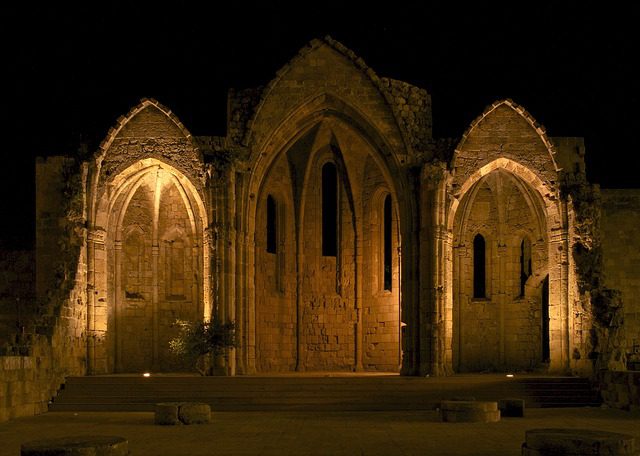 Photograph by “skeeze” (11-17-14) [Pixabay / Pixabay license]
Photograph by “skeeze” (11-17-14) [Pixabay / Pixabay license]
*****
(6-5-03)
***
These questions and comments of mine came about on a public Catholic Discussion Board, in dialogue with a Reformed Protestant.* * * * * Are we to believe that the Bible presents or teaches no single ecclesiology? Is the governance of the Church of Christ is strictly a matter of relativism and individual choice and happenstance (sort of like secular democracy)?
I find it fascinating that our Lord Jesus and the apostles could not (in this scenario) come up with a scheme of government that would hold for all time in Christianity. They couldn’t even devise a system as “absolute” and continuous as, say, the American form of government or as self-evidently necessary as the organization of any company, city, or state whatever. What about the Jerusalem council? Was that meant to be some sort of ongoing model or merely a one-time event?
*
What about Nicaea and Chalcedon and other generally-respected early ecumenical councils? If they were so important why would we think today that we can make do with the Bible alone and no longer need authoritative, binding councils? By what criterion did the conciliar principle change so that it is no longer relevant to any Protestant body in the present time (or for that matter, episcopacy)?
How and why did the normative patristic principle of apostolic succession change or get thrown out as a binding authority? Does the Bible (applying the principle of sola Scriptura) teach authoritatively about ecclesiology or are we all on our own?
If the latter, how many other aspects of doctrine in Christianity are also not authoritatively determined by Holy Scripture?
And if it is up to groups and individuals, how does the individual determine which is the best tradition of ecclesiology? And how can such necessary contradictions (e.g., episcopacy vs. congregationalism) indicate the presence of ecclesiological truth, since a contradiction necessarily entails a falsehood, and all falsehood is not of God?
I think it is good to discuss the fundamentals of ecclesiology, so people can see that the issue is not simple, but quite complex. Here are yet more questions that Protestants need to answer:
*
1. If ecclesiology is not based on biblical teaching (or, similarly, if the Bible is not sufficiently clear enough for Christians to arrive at a conclusion concerning what it teaches on ecclesiology: a sort of “hermeneutical or systematic theological agnosticism,” if you will), then on what is any particular brand of ecclesiology based?
*
2. If it is fundamentally (if not entirely) based on your “whole lot of tradition and history,” then haven’t you already left the realm of sola Scriptura because you have admitted that the Bible cannot tell us which ecclesiology is correct, so that you are forced to rely solely or primarily on tradition and history (much like the Catholic rule of faith, over against the Protestant)?
*
3. If it is based on a “whole lot of tradition and history,” then you have to identify which history and tradition it will be based on, since (as you love to point out) there are competing schemas or at least interpretations of Church history. How does one do that? How do you arrive at the conclusion of which history is the “orthodox” one or most “respectable” one?
*
4. How is this not merely “traditions of men” if you can’t trace this to the Bible and are forced to rely on men’s traditions apart from the Bible, which cannot resolve this issue? How many other such exceptions are there to the principle and modus operandi of sola Scriptura?
*
5. If these matters are merely contingent, and not at all a matter of biblical revelation, or unable to be determined by that revelation, whence comes your constant objection to the papacy-as-developed-in-actuality and/or the Catholic position on the papacy and ecclesiology in general, since I think even you would agree that at least we have one schema of Church history that has some credibility and plausibility (agree or disagree)?
*
In other words, how can you argue and rail against our ecclesiology, if indeed all ecclesiologies are merely tradition-based and not biblically-based, so that they are all (in the final analysis) epistemological equivalents? How can one be better than another? On what basis can one judge between them, apart from an ultimately arbitrary recourse to subjective personal opinion?
*
Further comment on question #5: It seems to me you would have to then treat the Catholic conception of the papacy with equally as much respect as non-denominational congregationalism (where the pastor is too often a de facto dictator) or Anglican episcopacy or the Landmark Baptists, who claim to trace their lineage through people like the Cathari and Albigensians (i.e., anyone they can find throughout history who isn’t a Catholic).
*
6. If indeed ecclesiology is merely a “contingent” matter, where differences are allowed by God and that’s all fine and dandy and normative, and to be expected, can you point to a biblical passage which verifies that stance? In other words, is ecclesiological “diversity” (I say, “relativism”) expressly taught in Holy Scripture? Is theological diversity, period, taught there? If not, what does it teach about ecclesiology? Will you contend that we can learn nothing in Scripture about these matters?
*
7. This would seem to be the case, according to Protestantism, with regard to a number of areas; the most notable (besides ecclesiology) being baptism. Protestants are forced to conclude that the Bible has no clear or perspicuous teaching on baptism, since they can’t agree, and split into five major camps:
a) Infant, non-regenerative baptism (Presbyterians)
b) Infant regenerative baptism (e.g., Lutheranism and Anglicanism)
c) Adult non-regenerative baptism (Baptists, most pentecostals and non-denoms)
d) Adult regenerative baptism (e.g., Church of Christ, Disciples of Christ)
e) No baptism (Quakers and Salvation Army)
But, of course, that takes us into deep waters of the self-defeating nature of perspicuity itself (to which I have never received even a remotely satisfactory response from Protestants).
It seems to me that at some point — given all these unresolvable difficulties — sola Scriptura and perspicuity themselves need to be seriously questioned, or else (even more fundamentally) one is left with a weakened view of biblical authority, whereby Scripture cannot teach us truth in so many areas, and is thus (practically-speaking) insufficient for the purposes of establishing Christian orthodoxy.
*
These are, in a nutshell, the objections I would have to the Protestant notion of permissible “diverse” ecclesiologies. We need to get down to the premises of all this. I always do that, and am now asking for responses to my questions.
Unless axioms and presuppositions are examined, the danger for all is to build castles of sand, with questionable foundations. I think any Protestant ecclesiological system can be shown to be disturbingly incoherent, per my questions and whatever answer a Protestant could give. If you guys play along with me on this, I’ll be happy to demonstrate exactly why I feel that way, by going through the process of examination with you.
*****














